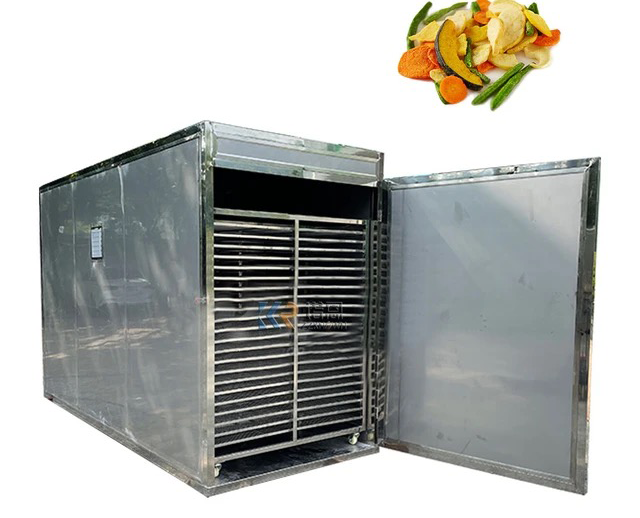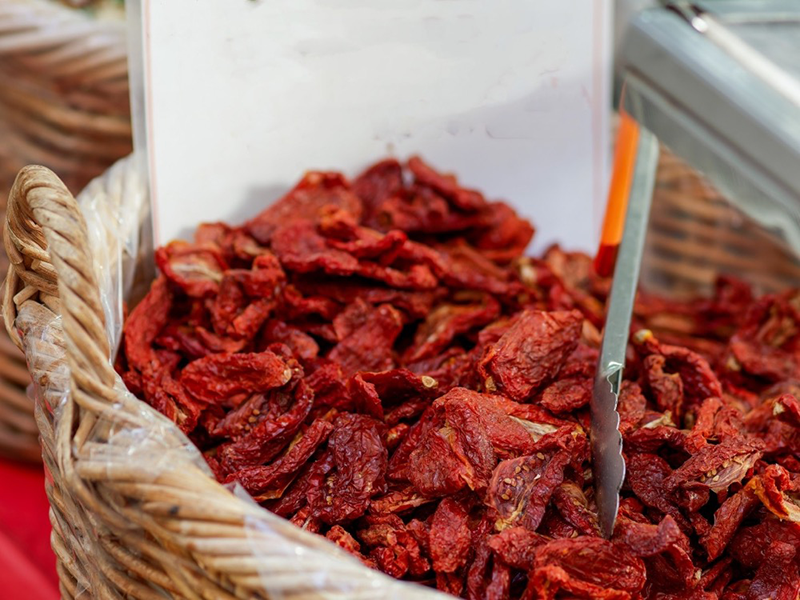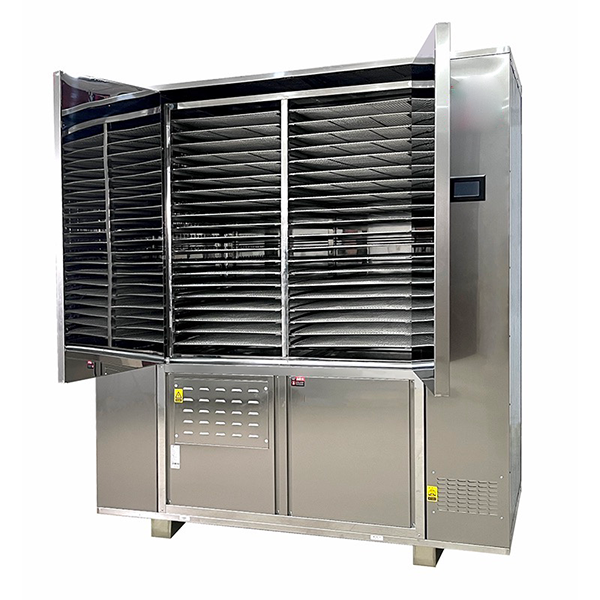
Content Menu
● Introduction to Compact Dryers with Heat Pump Technology
● What is a Compact Dryer?
>> Key Features of Compact Dryers
● How Does Heat Pump Technology Work?
>> 1. Air Intake
>> 2. Heat Exchange Process
>> 3. Drying Chamber
>> 4. Condensation
>> 5. Recycling Air
● Advantages of Using Compact Dryers with Heat Pump Technology
>> Energy Savings
>> Improved Food Quality
>> Environmentally Friendly
>> Versatility
● Applications of Compact Dryers in Food Processing
>> 1. Snack Food Production
>> 2. Herb Drying
>> 3. Meat Preservation
>> 4. Agricultural Products
>> 5. Culinary Applications
● Maintenance Tips for Compact Dryers
● Innovations in Heat Pump Technology
● Future Trends in Food Drying Technology
● Conclusion
● FAQ
>> 1. What types of foods can be dried using compact dryers with heat pump technology?
>> 2. How does heat pump technology save energy compared to traditional drying methods?
>> 3. Can I use a compact dryer for home use?
>> 4. What maintenance is required for compact dryers?
>> 5. Are there any safety concerns when using compact dryers?
Introduction to Compact Dryers with Heat Pump Technology
In recent years, the demand for efficient and sustainable drying solutions has surged, particularly in the food processing industry. Compact dryers equipped with heat pump technology have emerged as a revolutionary option, providing energy-efficient drying while maintaining the quality of food products. This article delves into how these innovative machines operate, their benefits, and their applications in food drying.

What is a Compact Dryer?
A compact dryer is a small, space-saving appliance designed to dry various materials efficiently. Unlike traditional dryers that rely on direct heat sources, compact dryers with heat pump technology utilize a closed-loop system that recycles air and energy, making them more environmentally friendly and cost-effective.
Key Features of Compact Dryers
- Energy Efficiency: Heat pump technology significantly reduces energy consumption compared to conventional drying methods.
- Space-Saving Design: These dryers are designed to fit in smaller spaces, making them ideal for various settings.
- Versatile Applications: Suitable for drying fruits, vegetables, herbs, and other food products.
How Does Heat Pump Technology Work?
Heat pump technology operates on the principle of transferring heat from one place to another rather than generating heat directly. Here's a step-by-step breakdown of how it works in a compact dryer:
1. Air Intake
The dryer draws in ambient air from the surrounding environment. This air is often at a lower temperature and humidity level.
2. Heat Exchange Process
The incoming air passes through an evaporator coil where it absorbs heat from the refrigerant circulating within the system. This process cools the refrigerant and warms the air simultaneously.
3. Drying Chamber
The warmed air is then directed into the drying chamber where it circulates around the food products. As the warm air passes over the items, moisture is absorbed from them.
4. Condensation
After absorbing moisture, the now-humid air is routed back to the evaporator coil where it cools down. The moisture condenses into water droplets and is collected in a reservoir or drained away.
5. Recycling Air
The cooled air is reheated by passing through the compressor before being recirculated back into the drying chamber. This closed-loop system minimizes energy loss and enhances efficiency.
Advantages of Using Compact Dryers with Heat Pump Technology
Energy Savings
One of the most significant advantages of using compact dryers with heat pump technology is energy efficiency. These machines can reduce energy consumption by up to 50% compared to traditional dryers, leading to substantial cost savings over time.
Improved Food Quality
Heat pump dryers operate at lower temperatures than conventional dryers, which helps preserve the nutritional value, flavor, and color of food products. This is particularly important for dried fruits and vegetables that require careful handling to maintain their quality.
Environmentally Friendly
By using less energy and reducing waste heat emissions, compact dryers with heat pump technology are more environmentally friendly than traditional drying methods. They contribute to lower carbon footprints and align with sustainable practices in food processing.

Versatility
These dryers can handle a wide variety of food products, including:
- Fruits (e.g., apples, bananas)
- Vegetables (e.g., carrots, tomatoes)
- Herbs (e.g., basil, thyme)
- Meat and fish (e.g., jerky)
This versatility makes them an excellent choice for food manufacturers looking to diversify their product offerings.
Applications of Compact Dryers in Food Processing
Compact dryers with heat pump technology are increasingly being adopted in various sectors of the food industry:
1. Snack Food Production
Dried fruits and vegetable chips are popular snack options. Using compact dryers allows manufacturers to produce high-quality snacks while retaining essential nutrients. The controlled drying process ensures that snacks remain crispy without losing their natural flavors.
2. Herb Drying
Herbs require precise drying conditions to maintain their flavor and aroma. Heat pump dryers provide controlled environments ideal for herb drying, allowing producers to create high-quality dried herbs that are perfect for culinary use or herbal supplements.
3. Meat Preservation
For producers of jerky or dried meat products, these dryers offer a reliable method for preserving meat without compromising taste or safety. The low-temperature drying process minimizes bacterial growth while ensuring that the meat retains its flavor profile.
4. Agricultural Products
Farmers can use compact dryers to process surplus crops efficiently, reducing waste and increasing profitability. By drying excess produce during peak seasons, farmers can extend shelf life and reduce losses due to spoilage.
5. Culinary Applications
In addition to commercial production, compact dryers are also gaining popularity among home cooks and culinary enthusiasts who wish to dehydrate fruits for snacks or create homemade spice blends from dried herbs.
Maintenance Tips for Compact Dryers
To ensure optimal performance and longevity of compact dryers with heat pump technology:
- Regularly clean filters to maintain airflow.
- Check seals and gaskets for wear to prevent energy loss.
- Schedule professional servicing annually to address any potential issues early.
- Keep the dryer clean from any food particles or debris that may accumulate during use.
- Monitor water levels in condensation reservoirs if applicable; empty them regularly to ensure efficient operation.
Innovations in Heat Pump Technology
As technology continues to evolve, so do compact dryers with heat pump systems. Recent innovations include:
- Smart Technology Integration: Many modern units now feature smart controls that allow users to monitor and adjust settings remotely via smartphone apps.
- Enhanced Energy Recovery Systems: New designs improve heat recovery efficiency even further, minimizing energy consumption while maximizing output quality.
- Advanced Sensors: These sensors can detect moisture levels in real-time, adjusting drying cycles automatically for optimal results without manual intervention.
Future Trends in Food Drying Technology
The future of food drying technology looks promising as more manufacturers adopt eco-friendly practices:
- Sustainability Focus: With increasing awareness about climate change and sustainability, more companies are investing in technologies that reduce environmental impact while improving efficiency.
- Research on New Materials: Ongoing research aims at developing new materials for dryer components that enhance thermal efficiency or durability under high usage conditions.
- Integration with Renewable Energy Sources: Some manufacturers are exploring ways to integrate solar power or other renewable energy sources into their operations for even greater sustainability.
Conclusion
Compact dryers with heat pump technology represent a significant advancement in food drying processes. Their energy efficiency, ability to preserve food quality, versatility across various applications, and environmental benefits make them an attractive option for food manufacturers worldwide. As more businesses recognize these advantages, we can expect increased adoption of this innovative technology in the food processing industry.
The combination of technological advancements and growing consumer demand for high-quality dried foods positions compact dryers as essential tools in modern food production facilities. By investing in these systems now, businesses can not only enhance their operational efficiency but also contribute positively towards sustainable practices within the industry.

FAQ
1. What types of foods can be dried using compact dryers with heat pump technology?
Compact dryers can effectively dry a variety of foods including fruits, vegetables, herbs, meats, and fish.
2. How does heat pump technology save energy compared to traditional drying methods?
Heat pump technology recycles air within a closed-loop system, reducing energy consumption by minimizing heat loss during the drying process.
3. Can I use a compact dryer for home use?
Yes, compact dryers are suitable for both commercial and home use due to their space-saving design and efficiency.
4. What maintenance is required for compact dryers?
Regular cleaning of filters and checking seals are essential maintenance tasks. Professional servicing should be conducted annually.
5. Are there any safety concerns when using compact dryers?
As long as they are used according to manufacturer guidelines and properly maintained, compact dryers are safe for food processing applications.











